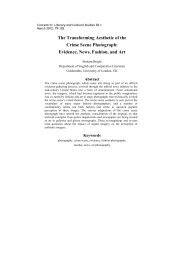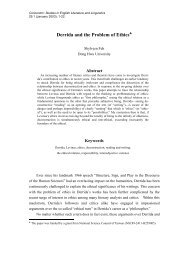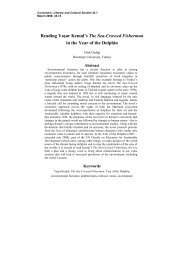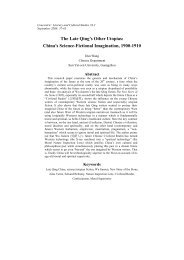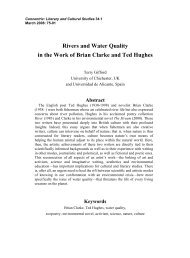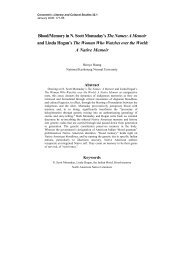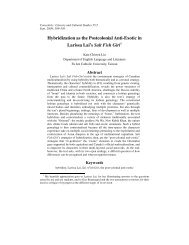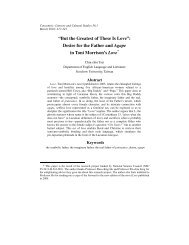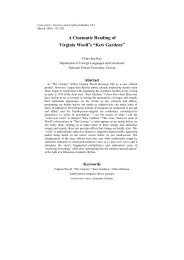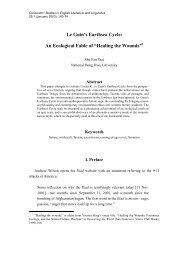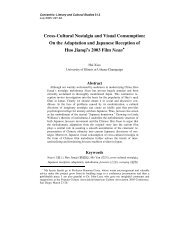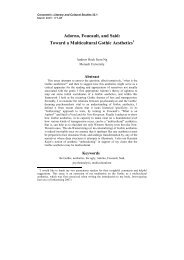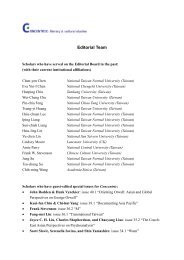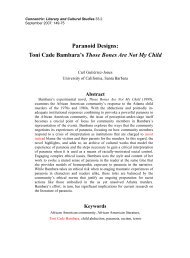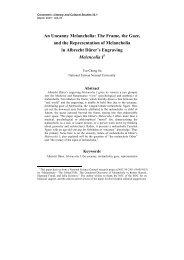The Gaze of the Other in Ang Lee's Crouching Tiger ... - Concentric
The Gaze of the Other in Ang Lee's Crouching Tiger ... - Concentric
The Gaze of the Other in Ang Lee's Crouching Tiger ... - Concentric
You also want an ePaper? Increase the reach of your titles
YUMPU automatically turns print PDFs into web optimized ePapers that Google loves.
183<br />
Tsai: Crouch<strong>in</strong>g <strong>Tiger</strong> and <strong>The</strong> Birds<br />
<strong>in</strong>herent enlightenment cultural heritage from <strong>the</strong> European Enlightenment with its<br />
claustrophobic concept <strong>of</strong> Western Man. Kenneth Lieberman writes:<br />
<strong>The</strong> marriage <strong>of</strong> <strong>the</strong> idea <strong>of</strong> self and civil authority propelled <strong>the</strong> political imag<strong>in</strong>ation <strong>of</strong><br />
<strong>the</strong> Enlightenment and still characterizes <strong>the</strong> West today. Self-certa<strong>in</strong>, rational<br />
<strong>in</strong>dividuals, protected by <strong>the</strong> Declaration <strong>of</strong> <strong>the</strong> Rights <strong>of</strong> Man and its progeny, freely<br />
select <strong>in</strong> a Hobbesian fashion a civil authority that <strong>in</strong> reality tolerates little diversion<br />
from <strong>the</strong> accepted corpus <strong>of</strong> reified truths (<strong>the</strong>oria). It is pert<strong>in</strong>ent to note that Descartes’s<br />
first moral rule <strong>in</strong> his epochal Discourse on Method was “to obey <strong>the</strong> law and customs <strong>of</strong><br />
my country” and church. (128)<br />
If we look <strong>in</strong>to Western culture <strong>in</strong> terms <strong>of</strong> race, gender and class, we cannot fail to<br />
conclude that <strong>the</strong> history <strong>of</strong> Man is a history <strong>of</strong> discrim<strong>in</strong>ation by means <strong>of</strong> a<br />
“Manichean aes<strong>the</strong>tics” (JanMohamed 1-13; Goldberg 14-40). Accord<strong>in</strong>g to<br />
JanMohamed, Manicheanism exercises rules <strong>of</strong> exclusion and punitive strategies so<br />
that <strong>the</strong> division <strong>of</strong> labor and tokenism are rendered possible: “Faced with an<br />
<strong>in</strong>comprehensible and multifaceted alterity, <strong>the</strong> European <strong>the</strong>oretically has <strong>the</strong> option<br />
<strong>of</strong> respond<strong>in</strong>g to <strong>the</strong> O<strong>the</strong>r <strong>in</strong> terms <strong>of</strong> identity or difference” (“Colonialist Literature”<br />
83). Accord<strong>in</strong>g to Charles Taylor, “Manichean aes<strong>the</strong>tics” (<strong>the</strong> aes<strong>the</strong>tics <strong>of</strong> a logical<br />
identity-and-difference) “shows not just a lack <strong>of</strong> due respect” for <strong>the</strong> O<strong>the</strong>r. “It can<br />
<strong>in</strong>flict a grievous wound, saddl<strong>in</strong>g its victims with a crippl<strong>in</strong>g self-hatred” (26).<br />
<strong>The</strong> awaken<strong>in</strong>g from such narcissistic solipsism and ground<strong>in</strong>g egocentrism leads<br />
us, for Nietzsche, to a revaluation <strong>of</strong> all values. With him <strong>the</strong> prestigious idols—“self,”<br />
“God”—have reached <strong>the</strong>ir twilight and <strong>the</strong> chaotic, chang<strong>in</strong>g or self-different self<br />
appears. For <strong>the</strong> subject “I” to be taken as <strong>the</strong> condition <strong>of</strong> <strong>the</strong> predicate “th<strong>in</strong>k” is a<br />
falsification <strong>of</strong> facts s<strong>in</strong>ce this correspondence between subject and object is quite<br />
arbitrary; <strong>the</strong>re is no “subject,” <strong>the</strong>re is only an <strong>in</strong>terplay <strong>of</strong> perspectives, forces, wills;<br />
what we th<strong>in</strong>k we know as “truth” can only be “a supposition, an assertion, and<br />
assuredly not an ‘immediate certa<strong>in</strong>ty’” (Beyond Good and Evil 24). Thus <strong>in</strong> <strong>The</strong> Will<br />
to Power: “‘Subject,’ ‘object,’ ‘attribute’—<strong>the</strong>se dist<strong>in</strong>ctions are fabricated and are<br />
now imposed as a schematism upon all <strong>the</strong> apparent facts. <strong>The</strong> fundamental false<br />
observation is that I believe it is I who do someth<strong>in</strong>g, suffer someth<strong>in</strong>g, ‘have’<br />
someth<strong>in</strong>g, ‘have’ a quality” (294). Nietzsche’s demystification <strong>of</strong> <strong>the</strong> I purports to say<br />
“yes” to life and to go beyond <strong>the</strong> asceticism <strong>of</strong> Western philosophy and <strong>the</strong><br />
megalomaniac concept <strong>of</strong> subjectivity. Follow<strong>in</strong>g a Nietzschean l<strong>in</strong>e <strong>of</strong> thought and



